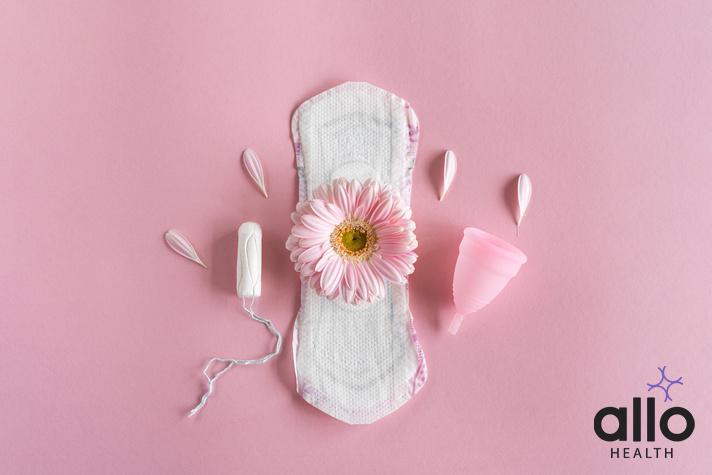Understanding The Signs of Virginity in Females

Allo Health is dedicated to personalized well-being, offering support and trusted information tailored to individual health goals. The platform emphasizes human-generated content, led by a distinguished medical team of experts, including physicians and sexual health specialists. Their commitment to credibility involves rigorous fact-checking, authoritative research, and continuous updates to ensure accurate, up-to-date information. Allo Health's unique approach goes beyond conventional platforms, providing expert-led insights and a continuous commitment to excellence, with user feedback playing a crucial role in shaping the platform's authoritative voice.

Dr. Aditi completed her undergraduate medical education at AJIMS, Mangalore, after which she worked in multi-speciality hospitals with COVID patients and in the Pain and Palliative medicine department. Driven by her experiences, she developed a keen interest in psychiatry. Dr. Aditi believes that mental health is just as, if not more important, than physical health.
Why This Was Upated?
Our experts continually monitor the health and wellness space, and we update our articles when new information became available.
Updated on 13 February, 2024
- Article was updated as part of our commitment to diversity, equity, and inclusion.

"The following blog article provides general information and insights on various topics. However, it is important to note that the information presented is not intended as professional advice in any specific field or area. The content of this blog is for general educational and informational purposes only.
Book consultation
The content should not be interpreted as endorsement, recommendation, or guarantee of any product, service, or information mentioned. Readers are solely responsible for the decisions and actions they take based on the information provided in this blog. It is essential to exercise individual judgment, critical thinking, and personal responsibility when applying or implementing any information or suggestions discussed in the blog."
Exploring the concept of virginity in females unveils a complex interplay of cultural beliefs, societal expectations, and biological realities. In this article, we delve into the multifaceted nature of virginity, aiming to demystify common misconceptions and shed light on the various signs associated with it. From historical perspectives to modern-day interpretations, understanding the signs of virginity involves navigating a terrain fraught with myths and taboos. Through a nuanced examination, we aim to provide clarity on this sensitive topic, empowering individuals to approach discussions surrounding virginity with informed perspectives and empathy.
Definition of Virginity
Virginity is a social construct often associated with a person’s sexual experience, particularly about the absence of prior sexual intercourse. However, its definition varies across cultures and contexts, challenging its universality. Beyond physicality, virginity can hold symbolic, religious, and cultural significance, influencing individual identities and societal norms. In contemporary discourse, the concept of virginity is being reexamined, with emphasis placed on consent, autonomy, and diverse experiences. Understanding virginity requires acknowledging its complexity, respecting personal interpretations, and fostering open dialogue to deconstruct its implications on gender, sexuality, and human relationships.
Signs of Virginity in a Woman
- Understanding Virginity Perception: It’s crucial to acknowledge that determining a woman’s virginity isn’t straightforward. There’s no foolproof sign, but several indicators might suggest a lack of sexual experience. However, absolute certainty is unattainable.
- Observing Behavior: If direct inquiry feels uncomfortable, observing her behavior can offer insights. A woman’s reluctance to engage in sexual activities or discomfort in intimate situations might hint at her virginity.
- Delaying Intimacy: A woman who consistently postpones sexual encounters might be inexperienced. While there’s no fixed timeline, prolonged courtship without sexual intimacy could signify virginity.
- Physical Interaction: Inexperienced individuals may exhibit discomfort or uncertainty in physical interactions. Awkwardness during embraces or caresses could suggest virginity, but it’s not definitive due to factors like shyness or nervousness.
- Foreplay and Sensuality: During intimate moments, a woman’s restlessness or eagerness to end proceedings may stem from nervousness about penetration. Understanding and prioritizing foreplay can alleviate anxiety and enhance the experience.
- Condom Usage: While incompetence with condoms might hint at virginity, it’s not conclusive. Inexperience in handling a penis or uncertainty in sexual practices could indicate virginity.
- First Penetrative Sex: Nervousness and uncertainty are common during a woman’s first penetrative sex. She may desire control over the process but should be guided to ensure comfort and minimize discomfort.
In conclusion, open communication is key. Directly discussing experiences and expectations fosters mutual understanding ensures a positive, consensual sexual encounter, and helps overcome myths about virginity.
Things Happened After Losing Virginity

- Vaginal Changes: Post-losing virginity, the vagina may experience subtle changes in elasticity and lubrication, adapting to sexual play.
- Clitoris and Uterus Know When to Expand: Enhanced blood flow to the clitoris and uterus occurs during arousal, leading to heightened sensitivity and potential expansion post-sexual activity.
- Firmer Breast: Sexual arousal triggers hormonal changes, including an increase in estrogen levels, which can temporarily firm up breast tissue by increasing vascular blood flow.
- Experiencing Vasocongestion: The body experiences vasocongestion during sexual arousal, causing genital tissues to swell with blood, resulting in sensations of fullness and warmth.
- Glowing Skin: Increased circulation and the release of endorphins during sexual activity can contribute to a temporary post-coital glow.
- Sensitive Nipples: Stimulation of the breasts and nipples during sexual activity can heighten sensitivity, potentially leading to increased arousal and pleasure.
- Happy Hormones: The release of neurotransmitters such as oxytocin and dopamine during sexual activity, love hormones can induce feelings of happiness, relaxation, and bonding.
- Delay in Periods: Hormonal fluctuations post-sexual activity may occasionally result in a delay in menstrual periods, particularly in individuals with irregular cycles.
- Emotional Difficulty: Losing virginity can bring about a range of emotions, from excitement to anxiety or even sadness, as individuals navigate the complexities of their sexual experiences and emotional responses.
Is Losing Virginity Painful?

Losing virginity may feel strange due to unfamiliar sensations, but it shouldn’t be painful. Communication with partners before and during sex is crucial to avoid discomfort.
- Taking things slow and discussing preferences freely can enhance the first-time experience.
- If sex becomes painful, it’s important to stop, take a break, or try something different.
- Investing time in hard foreplay, including kissing, caressing, and exploring, enhances arousal and prepares both partners for a better experience.
- Foreplay helps in self-lubrication of the vagina and penis, but additional lubrication may still be necessary for comfort during penetrative sex.
- Using lubrication is essential for anal sex, as the rectum doesn’t produce its lubrication.
- Lubrication can also be beneficial for penile-vaginal intercourse (PIV sex) to prevent friction and increase comfort.
- Emotional Vulnerability: Losing one’s virginity can lead to a range of emotions, including anxiety, excitement, and vulnerability.
- Identity Shift: It can prompt a shift in one’s sense of self, as the individual may grapple with questions of identity and self-worth.
- Social Pressure: Societal expectations and peer pressure can exacerbate the psychological impact, influencing feelings of inadequacy or accomplishment.
- Relationship Dynamics: The experience may affect love and relationships, shaping trust, intimacy, and communication with partners.
- Cultural Influence: Cultural beliefs and values surrounding virginity can add layers of complexity, impacting feelings of guilt, shame, or empowerment.
- Personal Development: It can mark a significant milestone in personal development, prompting reflection on values, desires, and future goals.
- Mental Health: For some, the experience may trigger mental health issues such as depression or anxiety, requiring support and coping mechanisms.
How To Talk To Your Partner About Your Virginity?
When it comes to sex, communication is key. If you are a virgin and unsure how to approach the topic with your partner, it can be helpful to have an open and honest conversation with them beforehand. Let them know your boundaries and what you are comfortable with, and listen to their concerns as well. Remember that it’s okay to take things at your own pace and that you don’t owe anyone your virginity.
It’s important to also consider the emotional aspect of losing your virginity. It’s normal to feel nervous or anxious, and it’s okay to express those feelings to your partner. Make sure you are both on the same page about the emotional implications of having sex for the first time. Remember that losing your virginity is a personal decision and should only happen when you feel ready and comfortable.
Myths and misconceptions about female virginity
There are many myths and misconceptions surrounding female virginity that perpetuate harmful stereotypes and attitudes. It’s important to be informed and educate yourself on these concerns and to challenge harmful beliefs and behaviors. Remember that everyone’s sexuality is unique and personal and that there is no one “correct” way to be a sexual person.
One common myth about female virginity is that it can be determined by the presence or absence of a hymen. However, the hymen can be stretched or torn for many reasons other than sexual activity, such as physical activity or using tampons. Additionally, not all women are born with a hymen. It’s important to recognize that the state of someone’s hymen does not determine their sexual history or worth as a person.
How to Embrace Your Sexuality Regardless of Your Virginity?
Whether you are a virgin or not, embracing your sexuality is an important part of being a healthy and fulfilled person. This can involve exploring your desires and interests, learning about different aspects of sex and sexuality, and finding a supportive community of like-minded individuals.
It’s important to note that being a virgin does not define your worth or value as a person. Society often places a lot of pressure on individuals to have sex, but it’s important to remember that everyone’s journey is different. Whether you choose to wait until marriage, or until you feel ready and comfortable with a partner, it’s important to make decisions that align with your values and beliefs. Embracing your sexuality is about feeling empowered and confident in your skin, regardless of your sexual experiences.
Most Asked Questions
-
What are the traditional signs of virginity in females?
This article explores various cultural and historical perspectives on indicators of female virginity, including intact hymen, bleeding during first intercourse, and absence of sexual experience.
-
Can the presence of an intact hymen reliably indicate virginity?
The article discusses the complexities surrounding hymen integrity, highlighting that it can be influenced by various factors such as physical activities, tampon use, and medical conditions, challenging its reliability as a sole indicator of virginity.
-
Are there other physical signs that suggest female virginity?
Beyond the hymen, the article delves into additional physical signs like the tightness of vaginal muscles and the absence of vaginal lubrication, shedding light on their cultural interpretations and medical accuracy.
-
How do societal norms impact perceptions of female virginity?
This article examines how cultural and societal expectations shape attitudes toward female virginity, including the stigma and pressure surrounding it and the implications for women's rights and autonomy.
-
What are the modern perspectives on virginity?
The article explores evolving attitudes towards virginity, emphasizing the importance of consent, sexual education, and debunking myths surrounding virginity in contemporary discourse.






































